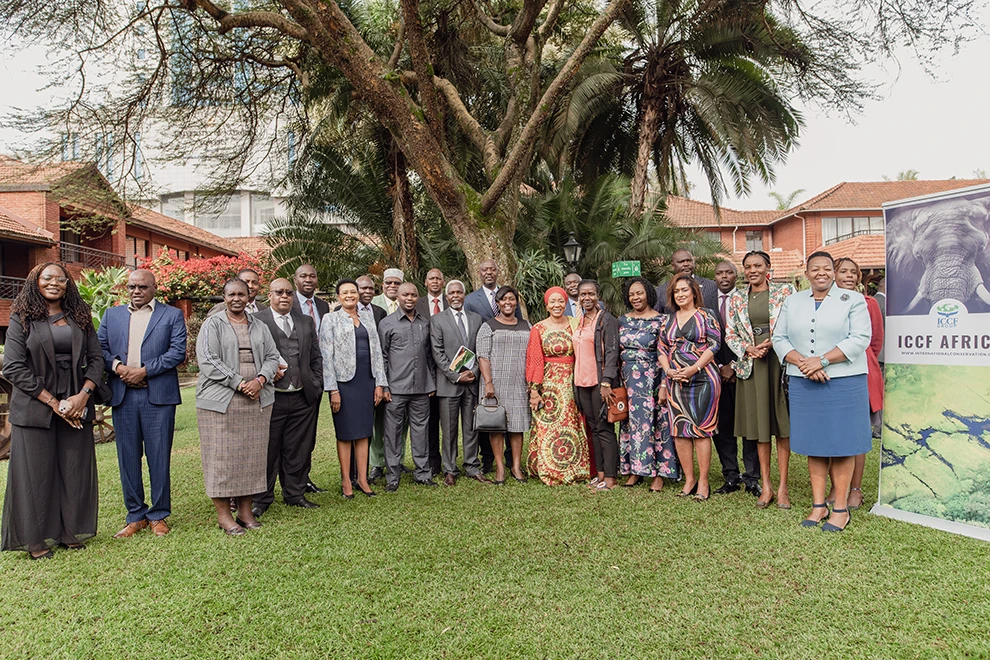The conservation and management of natural resources play a critical role in realizing Kenya's Vision 2030 - the country's development blueprint covering the period from 2008 to 2030 - as all developments across the economy rely on natural assets in various ways.
However, challenges pose a threat to the sustainability of these natural resources and their ability to support the economy. In response, the Parliamentary Conservation Caucus-Kenya (PCC-K), with the support of the ICCF Group and its partners, developed a Strategic Plan aimed at fostering innovative approaches to drive economic growth, improve livelihoods, and conserve and preserve the ecosystem services provided by the environment.
On June 22nd, 2023, the ICCF Group hosted a breakfast meeting in Nairobi, Kenya with members of PCC-K to review and validate the Strategic Plan. The meeting was attended by 29 members of PCC-K and senators. The speakers for this briefing included Hon. Charity Kathambi, Co-Chair of the PCC-K; Sen. Moses Kajwang, Chairperson and Convener of the PCCA; Sen. John Methu, Chairperson of the Committee on Land, Environment and Natural Resources; and Mr. Mamo Boru, Director General of the National Environmental Management Authority (NEMA).
In her opening remarks, Hon. Charity Kathambi noted that there exists a disconnect between some environmental policies and emphasized the urgent and critical need for harmonization to address this issue. She also highlighted the importance of planting trees as a way of tackling the crisis and urged the legislators to participate in President William Ruto's initiative to plant 15 billion trees by 2032.
Sen. Moses Kajwang applauded the PCC-K members for developing a comprehensive Strategic Plan and expressed his belief that the caucuses share a similar vision. He emphasized the members' commitment to conservation matters and urged them to collaborate where their mandates allow. Senator Kajwang pointed out the existing obstacles in accessing appropriate funds, such as the loss and damage fund and funds for capacity building to address conservation-related issues. He acknowledged President William Ruto's administration for its approach to finance conversation and the focus on a finance architecture that benefits African countries. Senator Kajwang concluded by urging the members to start thinking about how they can participate meaningfully in conversations around Nationally Determined Contributions (NDCs).
Sen. John Methu noted that capacity building initiatives on conservation should be complemented by tangible actions. He emphasized the need for legislators to work closely with their constituents to implement specific action points.
Mr. Mamo Boru Mamo began his presentation by stating that the Kenyan constitution is a green constitution, and the country has an enabling legal and policy framework that addresses environmental issues.
He mentioned acts such as the Environmental and Coordination Act of 1999 and the recently enacted Sustainable Waste Management Act of 2021, which guarantee the right to a clean and healthy environment as long as there is a shared understanding among the public that enhancing the environment's quality is their responsibility. He appealed to the legislators to prioritize the environmental agenda and diligently fulfill their oversight role. Mr. Boru highlighted the increasing number of litigations NEMA faces from the public, which they encourage, as being accountable to the people is their key role.
Mr. Philip Kilonzo began his presentation by emphasizing that communities should be at the center of any key strategic processes. He highlighted the importance of analyzing the benefits communities receive from these processes. This significance is even more pronounced for legislators, as they serve as representatives of the people. Mr. Kilonzo proposed several actions to increase the interests of those they represent on such issues. These actions include strengthening advocacy efforts collectively as legislators, promoting a just transition to low-carbon, sustainable development pathways, and enhancing accountability and oversight measures. He urged the legislators not to confine themselves to national laws but to proactively engage with international agreements. Furthermore, he encouraged them to position themselves as drivers of a global stock-taking process on issues such as reducing carbon emissions.
To conclude the meeting, Ms. Jill Barasa, ICCF Africa Program Director, invited the legislators to share any additional input on the Strategic Plan before its official launch on July 13th, 2023, which will also serve as a public re-introduction of the PCC-K to stakeholders working in Kenya.

 Regional Headquarters
Regional Headquarters